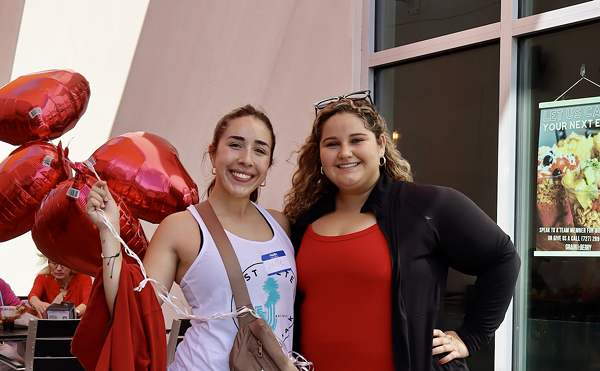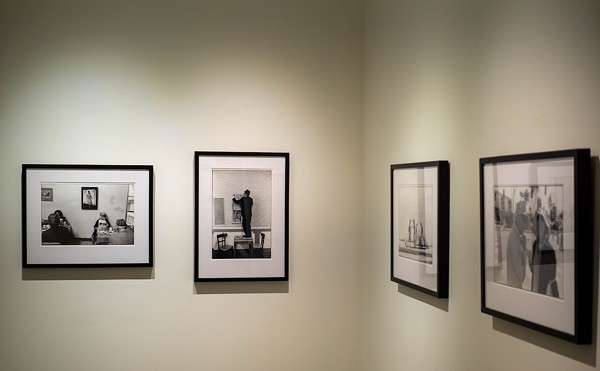American Stage's Altar Boyz is a pleasant, well-meaning bore, a celebration of Christian rock that shies away from (almost) every controversy and revels in its own shallowness like a student production at an elementary school. Which doesn't mean it's not professional: No, the show's five actors are expert singers and dancers; Steven Flaa's direction and choreography are airtight; and the four-piece band backing the songs is in every way first class.
But to a degree that's almost astonishing, this is a musical about nothing. No issue of importance, from the creationism/evolution debate to the status of gays and the conflict about abortion is ever treated with any honesty, and the inclusion of a Jewish band member in a group devoted to praising Jesus seems to have no other motive than to sell more tickets to a wider audience.
As for the humor in the show, it's mild and harmless like everything else. The music and lyrics, by Gary Adler and Michael Patrick Walker, are moderately interesting, the play's "plot" (and I use the word loosely) is lukewarmly engaging, and even the set, a bare stage backed by poster-sized images of the Boyz, is just sufficient and not a whit better. I can hardly wait 'til next year when a show with bite — the musical Hair — will be American Stage's offering in the Park. But for now, we'll have to do with this super-cautious trifle. And seldom has a work about religion been so tepid.
The premise of the play is that the Boyz — Matthew (Dick Baker), Mark (Bradley Vile), Luke (Brendan Cataldo), Juan (Nick Cearly), and Abraham (Jonathan D. Lovitz) — are finishing up a cross-country tour, and have brought with them their Sony DX-12 Soul Sensor, a device that can tell how many persons in the audience are burdened with sin. On the evening I attended, the Sensor found 350 or so benighted souls whom the Boyz pledged to relieve with their songs. And with their acting as well: The anthems are interspersed with lots of stage business, including differing accounts of how the band was first formed, the tale of Juan's search for the birth parents who abandoned him, an account of Luke's mental exhaustion and rehab, and the possibility that the Boyz will break up to pursue solo careers.
Certain hot topics are approached and then conveniently avoided: Mark, clearly about to admit that he's gay, instead confesses that he's a Catholic, and Matthew, extolling the virtues of abstinence, announces that until he'll married, he'll just have to master ... his fate. A few minutes are given to "confession sessions" — ostensibly members of the audience have spilled their deepest secrets on paper, and the Boyz have decided to read some of them aloud. An example suggests the general level of the humor: a certain "Georgette" announces that she covets her neighbor's ass, to which Juan responds that love of a donkey is not so terrible.
If there's a through-line in all this silliness, it's the DX-12 Soul Sensor. At various times the Boyz return to it to see whether they're lifting souls out of their morass. When there are only a few souls still in perdition, the Boyz utilize special "Song 918," an exorcism number with the refrain "Get the hell out." No quagmire is too deep for the Boyz and their music.
As I said, all the actors are talented, but the show's authors haven't bothered much to distinguish one band member from the other, so we rely on Frank Chavez's costumes (a vest for this one, a baseball cap for that), to help us tell one Boy from the next. Still, there are just enough characteristics to make a caricature: Mark expresses his gayness with a hyper-sweet delivery and some eye-batting at a comrade; Juan speaks with a Mexican accent and seems sexually interested in audience females; Abraham (wearing a skullcap) has a somewhat macho personality; and breakdancer Luke is a sort of slacker/stoner/rapper (I have no idea what Matthew represents).
There are two or three inventive jokes and one stunningly incisive moment: a Boy asks if Jews are allowed in the church, and Abraham responds, "I think so. I just saw one on the cross above the altar." But for the most part the patter (book by Kevin Del Aguila) is designed to offend no one, address nothing, and please us all. That's a recipe for blandness.
Is it possible, in 2009, to see a show about religion that ruffles no feathers? Yes, and that show is Altar Boyz.
Only an atheist could find something upsetting here.
And that's no recommendation.















